ROBIN HOOD BALLADS
There is plentiful “learning” about Robin Hood, but no real knowledge. He is first mentioned in literature, as the subject of “rhymes,” in Piers Plowman (circ. 1377). As a topic of ballads he must be much older than that date. In 1439 his name was a synonym for a bandit. Wyntoun, the Scots chronicler, dates the outlaw in the time of Edward I. Major, the Scots philosopher and master of John Knox, makes a guess (taken up by Scott in Ivanhoe) as the period of Richard I. Kuhn seeks to show that Hood is a survival of Woden, or of his Wooden, “wooden horse” or hobby horse. The Robin Hood play was parallel with the May games, which, as Mr. Frazer shows in his Golden Bough, were really survivals of a world-wide religious practice. But Robin Hood need not be confused with the legendary May King. Mr. Child judiciously rejects these mythological conjectures, based, as they are, on far-fetched etymologies and analogies. Robin is an idealized bandit, reiver, or Klepht, as in modern Romaic ballads, and his adventures are precisely such as popular fancy everywhere attaches to such popular heroes. An historical Robin there may have been, but premit nox alta.
ROBIN HOOD AND THE MONK
This copy follows in Mr. Child’s early edition, “from the second edition of Ritson’s Robin Hood, as collated by Sir Frederic Madden.” It is conjectured to be “possibly as old as the reign of Edward ii.” That the murder of a monk should be pardoned in the facile way described is manifestly improbable. Even in the lawless Galloway of 1508, McGhie of Phumpton was fined six merks for “throwing William Schankis, monk, from his horse.” (History of Dumfries and Galloway, by Sir Herbert Maxwell, p. 155.)
ROBIN HOOD AND THE POTTER
Published by Ritson, from a Cambridge Ms., probably of the reign of Henry vii.
ROBIN HOOD AND THE BUTCHER
Published by Ritson, from a Black Letter copy in the collection of Anthony Wood, the Oxford antiquary.
Footnotes:
{1} See Pitcairn, Case of Alison Pearson, 1586.
{2} Translated in Ballads and Lyrics of Old France.—A. L.
{3} “Kinnen,” rabbits.
{4} “Nicher,” neigh.
{5} “Gilt,” gold.
{6} “Dow,” are able to.
{7} “Ganging,” going.
{8} “Targats”, tassels.
{9} “Blink sae brawly,” glance so bravely.
{10} “Fechting,” fighting.
{11} “Kirsty,” Christopher.
{12} “Hald,” hold.
{13} “Reek,” smoke.
{14} “Freits,” omens.
{15} “Wighty,” valiant.
{16} “Wroken,” revenged.




